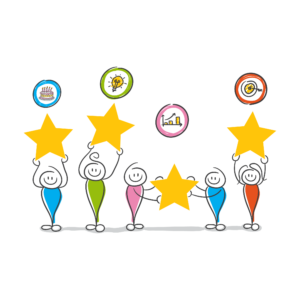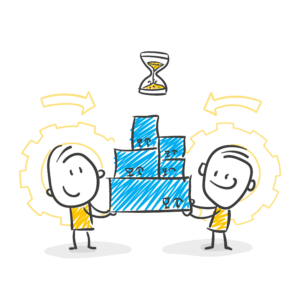Recognition
Retention of Talent Using Peer Recognition Tools

2022 has been unique in every possible way. The world is bouncing back from the after-effects of the pandemic, the economy is yet unstable, industries have been compelled to adopt hybrid work models, and workforces in every organization are seeing major changes and reshuffles. In the United States of America, there is a new employment crisis to be dealt with. There are about 8.4 million people who are unemployed. While this figure may seem huge and worrying, there is a twist to the tale.
At the same time, the United States of America has more than 10 million job openings!
This is undoubtedly baffling as many individuals who are collecting unemployment benefits are being pushed by the government to take up one of the many job openings and are unwilling to do so. The reason behind this is straightforward, and there are millions of individuals who face a mismatch between the jobs they are offered and the jobs they want. While for many, it is simply a case of unreasonable demands, for some, it is a case of not finding jobs that match their qualifications and calibre.
All of this does put both the job seekers and those hiring collectively in a difficult situation. Every business in the United States of America is short-staffed; they are unable to find suitable employees, they are offering increased pay, they are taking a cut on their margins, and yet there seems to be no respite in sight. This does bring us to the highlight of our blog, Can using peer recognition tools help in the retention of talent?
The Complexities of Employee Retention:

Employee retention is a challenge in the world of business, and often decision-makers in an organization lose sleep over the fear of losing talent that is vital for the smooth running of the organization. The talented employees of your organization must be sought after by other organizations, and if presented with a better opportunity and package, they may jump ship, leaving your organization stranded.
The void created by the departure of such talent is often hard to fill and could even end up hampering the day-to-day operations of your organization for a long period of time. In our opinion retaining talent involves a subtle craft, the ability to make every such employee feel like they’re home, and they must be given a say in every important matter that the organization deals with. Only when they have been heard, and their ideas have been taken into consideration shall they feel valued. But over and above this, they aspire to be valued by giving their work the limelight.
In their opinion, it is often the hard work they have put in that has made a difference, and they wish to be recognized for it. It is undoubtedly a basic human tendency to crave attention and desire recognition. Whether it is a pat on the back, a shout-out to them, or appreciation by peers, they’ll take it all when given the opportunity.
Hence, it is true that peer recognition is vital to the retention of talent in an organization. However, the strategy adopted by an organization to execute the peer recognition program plays a major role in deciding whether or not it is indeed successful in retaining talent. Thus, we share a few tips that you must try and adhere to retain the best talent in your organization.
Better Recognition Leads To Better Communication:

PeerFives is a comprehensive peer recognition tool that is based on the idea that recognizing good work must not face any delays; it should be instant, it should be consistent, and it should be genuine. Only when such type of recognition is imbibed into the DNA of an organization then shall it witness organic employee engagement and better communication between the employees. It develops a culture of recognition and reward while also helping each and every employee feel personally invested in contributing to the overall success of the organization.
Recognize Everything:

Often, organizations are focused on recognizing victories and successes; this, in our opinion, is a one-dimensional approach to peer recognition. True peer recognition involves recognizing every single effort that positively contributes to the growth of the organization. It also involves recognizing and promoting the mindset of employees and every personal milestone of theirs as well.
Organizations must celebrate wins; these include:
- Individual and Group Performances.
- Goals Achieved
- Any new business generated for the organization.
Positive Mental Approaches to celebrate:
- Following the Core Values of the organization.
- Out-of-the-box Thinking/Solutions.
- Never Die Attitude.
Career Milestones to Celebrate:
- Promotions.
- Added Responsibilities.
- New Skills Gained/Learned.
Personal Milestones to Celebrate:
- Birthdays
- Work Anniversaries.
- Wedding Anniversaries.
Consider All Aspects:

Recognizing and rewarding a peer must be done by keeping in mind all the various aspects that a normal human goes through in their daily life. Performance at work is directly affected by happenings in personal life. Thus, an important key to talent retention in an organization is to be empathetic towards every individual.
Fostering a culture of empathy while recognizing and rewarding peers shall go a long way in retaining real talent in an organization. Acknowledging the personal battles of an employee, motivating every effort made by them, incentivizing better physical and mental health, encouraging holistic wellness, and promoting social well-being, everything counts in the long run.
Factoring the overall health and well-being of an employee while gauging their performance at work and recognizing & rewarding them suitably sends out a clear message of the organization and every employee looking out for each other and having a humane environment does promote a family-like atmosphere which in turn promotes respect, freedom of expression, and loyalty that cannot be bought by competitors.
The Future:

In conclusion, we can ascertain that peer recognition indeed is the key to talent retention in an organization in these challenging times when many are going out of business due to a lack of staff. Every organization needs to nurture a culture of recognizing to develop a strong long-term bond that every employee in the organization recognizes and respects.

